Researcher: Monopolies are good

OPINION: Without monopolies consumers miss out on the best technology at a good price. The task is to prevent that monopoly from abusing its power.
ResearcherZone | 14. Aug 2018
By: Stefan K. Sløk-Madsen, PhD fellow, Department of Innovation and Organizational Economics, CBS.
The economy is top on the list of public debate. Unfortunately, economic theory is not.
But when it does come to the surface, to a trained ear like mine, I can’t help but wonder sometimes whether the talented economists have forgotten some basics.
This was most recently illustrated during discussions of major tech firms like Facebook, Apple, Microsoft, Google, and Amazon (FAMGA), and their apparent monopoly and loss of consumer welfare as a result.
The critic’s argument is that they expect consumers to pay a high price and receive a poorer quality from one provider as opposed to if they had the option of buying from a number of different providers, and that these companies gain a form of power. Here’s an example of this argument.
The problem with this understanding arises when concepts are taken out of context, which often happens in economic theory. When this happens, we assume that monopolies, where there is only one provider of a unique product, are bad and harm consumers.

We forget, that the answer to the harm caused by monopolies depends on why there is just one provider in the first place. This is crucial before we can say whether a monopoly is really a problem.
Competitive monopolies can be good
Monopolies arise all the time. If I start a business selling paper planes in the centre of Copenhagen, I’d have a monopoly as a seller of a unique product.
If we assume that I’m not very successful or that my planes aren’t very popular, I will still maintain my monopoly, and lose a lot of money.
But let’s say that my paper plane sales go through the roof. My profit will attract competitors, and then I no longer have a monopoly, unless I keep my prices low or my product is so good that it out competes the competition—either in price or innovation.
In either case, consumers are well served.
So it is also a question of whether the monopolies are competitive, and not just whether they are a monopoly per se.
Skilled entrepreneurs might create a monopoly by offering good prices and innovation, and this is good for the consumers seeking these products.
This pressurises competitive monopolists to create innovative products that offer an improvement on what is already on the market, but also drives innovation in terms of their internal processes to keep costs and prices down.
Google is not the dominant search engine because it has a monopoly, but because most consumers like it and the price of their service, and so they are big players in the advertising market.
The harm of monopolies depends on how they are framed
There are examples of natural monopolies, which many people consider as being harmful as they give unfair advantage to a monopolist. For example, a new bridge built between two regions of a country.

But even here, we have to consider the competition that surrounds it. Is it legal to make a competing bridge, for example? Or perhaps a ferry?
In this case, the bridge will be competitive, and although expensive, it will certainly be affordable. Bridges are not cheap, but if the bridge has received public funding, we are again closer to a potentially harmful monopoly, because it may be difficult to compete against public support.
Again, the damage is dependant on the framework.
Entrepreneurs want monopolies, of course!
Entrepreneurship is about achieving monopolies by offering innovative solutions at the right price. That price being set by the competition. If my product is good enough, then I want to gain a monopoly.
If we interfere with this, there is a danger that miss out on the best technology at the best price, and we perhaps even discourage entrepreneurs from trying to start new companies if they know they cannot profit from it.
It is the very nature of businesses and their limited resources that they become specialists, and this is what monopolists do.
Driving innovation of entrepreneurs
Over time, we see empirical evidence for large companies becoming ever more commercial but also declining innovation over time (see for example, Markides and Geroski, 2004).
Eventually, they either become out-dated as new technology comes along, stuck in what the economist Schumpeter called ‘creative destruction,’ or they acquire technologically talented companies as a way to secure their position as monopolists or market leaders.
This is how most industries are organised, and this is the trend that we have seen throughout the past century.

Entrepreneurs are also motivated to sell their new technology and move on to something new, rather than being responsible for the daily running of an established idea.
So competitive monopolies can also drive innovation and growth among startups.
Consumers also have a responsibility
In these times where people are all too aware of their personal data and how they are used by Google and Facebook, these and the other FAMGA companies are often seen as having a dangerous monopoly.
But consumers cannot run away from their own responsibility as users of Facebook and similar services: That a part of the price we pay for such services is our personal data.
If you are not happy with this, then you do not need to use them, and they will learn to sell their services by some other means.
Ask yourself: Why is it that you do not pay to use Facebook? After all, running the world’s largest coupon book and school notice board comes at a cost.
You might feel pressured to use services like Facebook, but that is because they are effective.
But there are still plenty of ways you can keep in touch with people. You could write a reminder in your calendar to call your friends at regular intervals. You could hand out flyers on political topics that are close to your own heart, and so on.
These solutions are not as effective, just like previous incarnations of social media, like MySpace. Effectiveness, is the benefit we get with competitive monopolies.
Law for Facebook monopoly had unexpected benefits
Of course, companies who hold a monopoly will defend it by non-competitive means, such as lobbying. Businesses strive to eliminate their competitors, so we cannot blame them for trying to achieve a monopoly or influence politicians by lobbying.
On the contrary, our political system should ensure that this is not an attractive option. In the spirit of the famous political economist, Adam Smith, the task of economic theory is to defend capitalism, not individual capitalists.

However, companies can try to avoid competition in a number of ways.
It could be directly, by receiving state aid, or indirectly, via laws that favour one enterprise over another (for example, by prohibiting competing technological solutions).
Both of these are about raising the price of competing with the monopoly holder—so-called, entry barriers.
So, even though Facebook are tearing their hair out over the new EU data protection regulations (GDPR), they also benefit as it is now significantly more costly to compete with them by creating an alternative product.
It is almost ironic that a nervousness about competitive monopolies, has in effect, secured the monopoly against competition.
Politicians should not offer benefits
We can therefore, expect those with a monopoly to try to protect it by reducing the competition. It is of course more secure for company earnings to have a monopoly protected against competition.
Unfortunately, this will lead to welfare loses for consumers and other real issues, such as a loss of effectiveness, which would otherwise come as a result of a competitive monopoly.

The task for politicians is to understand that competition is a means to discipline entrepreneurship.
So, politicians should not make special laws, or offer tax benefits, or any other benefit to companies for any reason, including promised jobs.
It always goes wrong and turns a competitive monopoly maintained by innovative development into one of retention and exploitation, built on artificial entry barriers. This is not the fault of ‘monopoly,’ but of political actions.






































































































































Comments